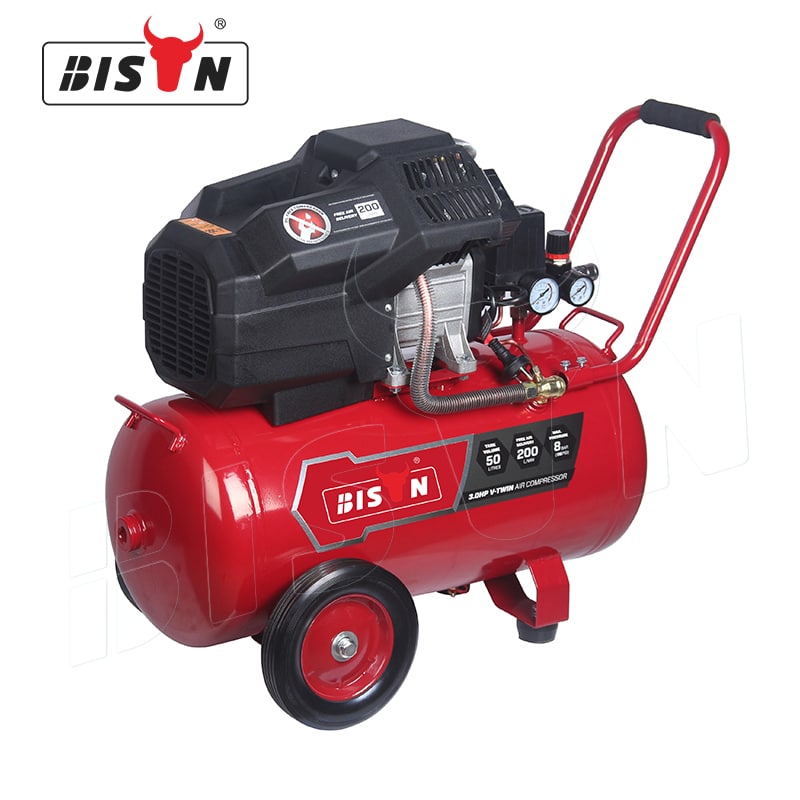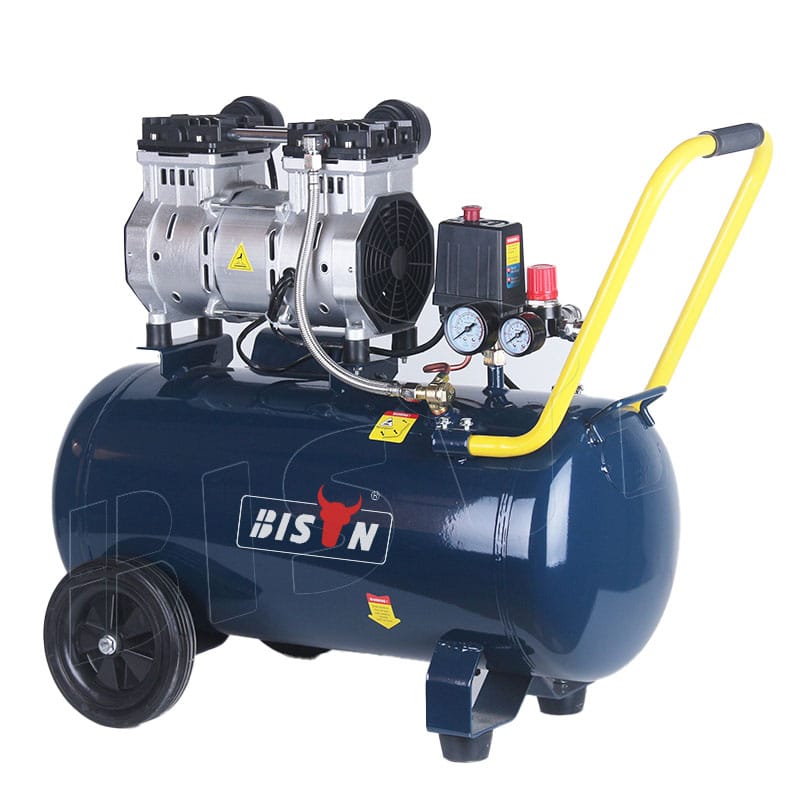एयर कंप्रेसर ब्लॉग
Air compressor oil: An in-depth guide
- नवम्बर 30, 2023
Typically, with the exception of oil-free air compressors, air compressors require a lubrication system to operate adequately and avoid extensive maintenance. Oil tends to act as a lubricant, which primarily helps reduce friction between components in the air compressor pump. This, in turn, generates less frictional heat, consumes less energy, and provides longer machine cycle life.
If you’re wondering how to choose the right type of air compressor oil, the best air compressor oil or anyother about air compressor oil, this in-depth air compressor oil guide has the answers!
What is air compressor oil?

Air compressor oils have specific additives that make them ideal for the working cycle inside an air compressor. Air compressor oils contain no detergents and generally have lower levels of sulfur (sulfur) and carbon than more common conventional motor oils. However, you can get non-detergent oil.
The carbon and sulfur content is ultimately measured in weight percent – but it can also sometimes be referred to as the ratio on the bottle. Air compressor oils can also sometimes be labeled “low sulfur” or “low sulfur,” depending on your region.
What kind of oil to use for air compressors?
There is an oil made specifically for air compressors, and it is a specific type, called air compressor oil. They are formulated for industrial use without any significant difference in cost compared to regular motor oils.
A common mistake many people make is that all oils are the same. It’s crucial to adhere to any instructions provided by the maker of the particular oil-lubricated compressor you’re using regarding the type of air compressor oil to use.
How to choose air compressor oil?
This rule on what compressor oil to use is simple. Use the professional air compressor manufacturers recommended oil if your air compressor is still covered by warranty and is usually stated in the compressor manual/guide. If your air compressor’s warranty has expired, you can ask for air compressor expert such as BISON.
Be aware that this guideline should only be used for compressors that are home DIY compressors. Some of the more complex and larger compressors used in industry – screw compressors, reciprocating compressors, etc. – have very specific requirements for the oil.
You must use the oil recommended by the compressor manufacturer; otherwise, the warranty will be void, and it may even cause oil-related problems. These problems will result in substantial maintenance costs that are completely avoidable.
How much oil does an air compressor need?
To reduce friction between moving elements like pistons, screws, and other moving parts of air compressors, continual oil lubrication is necessary. It’s crucial to routinely check the oil level in your air compressor to make sure it’s operating well and know how much oil the compressor needs.
You should consult your air compressor’s manual for instructions on how to inspect and add oil to your equipment before adding any oil. The manual will state exactly how much oil you should add to the oil sump for your compressor model. After reading the manual, you should be able to find the oil sight glass on the compressor. It can be found on the pump base of a reciprocating compressor or on the oil sump of a rotary screw compressor. You’ll see a dot in the sight glass’s center. The oil level should ideally be in the middle of the point. Your equipment needs more oil if the oil level is below this point. Too much oil has been added if the oil level is above this point.
What happens if you add too much oil?
Usually, when we think about adding/changing oil, we think of the oil in the car. There is a widespread misperception that oil is added to air compressors in the same way since oil often fills containers close to the top when it is added. However, adding the compressor’s oil sump to the top can cause serious internal damage to your unit. When excess oil from compressor discharge is atomized, it can damage your compressor and any air tools and accessories attached to it. Oily emissions can also destroy your final product, sometimes causing the project to have to be scrapped entirely and reworked. The oil that gets into the air stream will spoil any painting, sanding, or finishing application.
It’s crucial to make sure that your air compressor is always operating at the proper oil level in order for it to operate as effectively as possible. With preventive maintenance, you will greatly reduce the risk of damaging your project due to oil disturbances in the compressor airflow.
Risks of low oil in air compressor
Contamination or low oil levels in an air compressor can present several risks.
Overheating
Compressed air generates heat, and the oil absorbs some of that heat. If the oil level is too low, the air compressor will overheat due to increased friction. Tip:Check out this guide from professional air compressor supplier BISON: अपने एयर कंप्रेसर को ज़्यादा गरम होने से कैसे रोकें?
Wear
You replace the air filter of your air compressor to ensure pure compressed air. Likewise, air compressors must be regularly emptied of contaminated or old oil. The more you use it, the faster the debris and nanoparticles in the oil will build up. Clean, effective lubrication keeps your air compressor running smoothly and efficiently.
Rust and corrosion
Your air compressor’s metal fittings and components need adequate oil levels to prevent costly repairs due to rust, general wear, and corrosion.
Malfunction
Oil oxidizes over time when exposed to water and heat. As the oil breaks down, its effectiveness decreases. Eventually, the oil no longer serves its intended purpose, potentially leading to costly failures.
How to change the air compressor oil?

Guidelines for changing air compressor oil are given in the compressor manual. The guide is extensive and easy to understand, so following these steps is highly recommended.
To put it simply, the oil change process of the air compressor is as follows:
- Clean the area near the compressor oil tank and oil filter to avoid contamination.
- Remove the oil drain plug and pour the old oil into a container large enough.
- After the old oil is completely removed, tighten the oil drain plug and remove the oil filter.
- Clean the front of the tank’s gasket sealing surface thoroughly.
- A little layer of compressor oil should be applied to the rubber gasket of the new oil filter.
- Place the filter on the nipple and rotate until the gasket contacts the sealing surface of the tank. Tighten the filter properly so that it is fully seated on the gasket.
- Remove the oil filler cap from the tank and slowly begin pouring the compressor oil into the tank. Make sure to keep it steady to avoid any spillage.
- Stop adding oil once the oil reaches the “MAX” mark.
- Put the fuel filler cap back on and tighten it. Start the engine and make sure there are no oil leaks.
Which is better, synthetic oil or mineral oil?

The decision between synthetic and conventional air compressor oils mostly relies on your duty cycle- how often and continuously you use your air compressor.
Air compressor oil lubrication can be performed with synthetic or mineral oil bases. Mineral oil bases are often the standard oil for air compressors. Synthetic oils are heavily processed.
Careful consideration can be given when deciding which one to use. Both mineral and synthetic oils are excellent for oil-lubricated air compressors, so it’s important to analyze the type of work you plan to do with your air compressor and how much it will be used.
If you don’t use your air compressor frequently, a standard mineral oil air compressor lubricant may be suitable for you. This is because they are ideal for light to medium-duty air compressor operations. Best of all, these oils are cheaper than synthetic blends.
If you’re using air compressors consistently in an industrial setting, synthetic blends may be a better choice because they’re used more frequently. Multiple users report that their oil-lubricated air compressors run smoother and quieter with synthetic oil lubrication. Not only that, but synthetic oils have an overall larger temperature range and greater protection against overheating of air compressors.
Characteristics of an air compressor oil
As was previously noted, air compressors typically come with the manufacturer’s instructions. These guides will teach you the basics of air compressors. It should also tell you which oil will best ensure high performance.
Some of the fundamental traits that will be covered in the tutorial are listed below. We’ve explained each feature in detail so you know exactly what you need and how it affects your compression.
Viscosity
Viscosity refers to the texture or consistency of an oil. Viscosity is a very important property. If your oil is too thick or too thin, not only will it delay work, but it could also damage your compressor.
Temperature range
The temperature range of the air compressor oil is another characteristic that must be investigated. Oils with high viscosity can behave unpredictably when exposed to different temperature ranges. In regions with temperatures below freezing or above 120°F, your oil may react differently.
Your air compressor oil’s recommended operating temperature range will typically be listed on the packaging. Therefore, if you are in a region with harsh temperatures, you need to make sure the viscosity and temperature are appropriate for your area.
Another thing to consider is that your compressor also produces heat. You also need to consider this when purchasing oil. It needs to withstand the temperature range to work effectively.
Additives
All oils contain some additives. The types of additives present in the oil require specific consideration. Sometimes some additives in an oil can be beneficial in one situation but can be detrimental in another. For example, the detergent additive in diesel helps to clean diesel engines, but it can also damage your motor and shorten its life over time.
More beneficial additives in air compressor oil will help prevent motor corrosion and rust. These types of additives are beneficial and can often be found in various commercial varieties.
That is BISON in-depth guide for air compressor oil. We hope we’ve answered all the questions related to compressor oil. If you want to know what the difference between oil-free air compressors vs oil lubriacted air compressors, you can contact us. BISON’s experts are ready to answer your questions.
frequently asked questions about Air compressor oil: An in-depth guide
Can you put motor oil in an air compressor?
Air compressor oils are specially formulated for use in air compressor pumps. Air compressor oil does not include as many additives as motor or engine oil, which are used to maintain, repair, and safeguard the interior of the engine. Oil is designed to operate at lower temperatures and larger capacities.
Compressor oils, on the other hand, are produced through several processes, such as; solvent extraction, desalination, and evaporation, all designed to make them stable and effective at high temperatures.
Does every air compressor need oil?
Oil-free air compressors are not actually completely oil-free. Essentially, the term oil-free means that the compressor does not need to be changed or topped up with oil. In fact, oil-free air compressors are "factory sealed" and, therefore, cannot be refilled with original lubrication.
Over time, oil-free air compressors lose lubrication due to the degradation of the oil coating, and eventually lose lubrication, run at high wear - and eventually seize.
This is a typical DIY or home air compressor with light duty cycles or very infrequent duty cycles - like a car tire compressor that might be pulled out every 3 months during its life cycle.
If you have an air compressor in your house and are wondering if you should top it up with oil, check out the owner's manual! It's possible that it's a factory-sealed unit that doesn't need the oil changed or topped off.
How often should I change the air compressor oil?
Change the air compressor oil every 3 months for reciprocating compressors and every 7,000 hours for rotary compressors.
Once a year is ideal for MINIMUM. However, always refer to the user manual first.
यदि आपके पास BISON एयर कंप्रेसर के बारे में कोई पूछताछ है, तो हम आपसे सुनना पसंद करेंगे।











